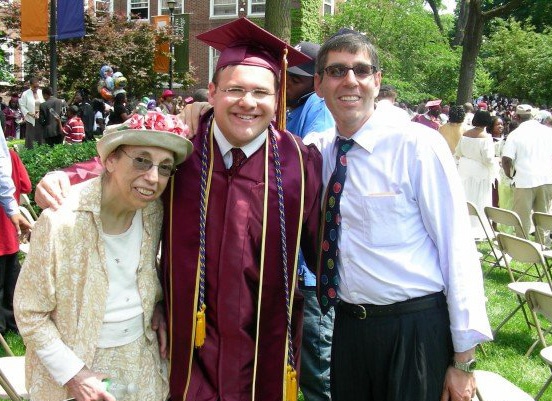By Ezra Rich
Earlier this week, on Jan. 4th, I thought of my paternal grandmother, Miriam S. Rich, Z”L (1931-2008) as it was her 90th birthday in heaven. She often reminded me that behind every great man is an even greater woman. One of her prime examples was that of First Lady Eleanor Roosevelt, whom she and her mother secured tickets to hear her in-person when Mrs. Roosevelt was the commencement speaker of my grandfather’s graduation from Yeshiva University in the early 1950s. (Please join Temple Beth Tzedek’s virtual series next month on the more difficult elements of FDR’s legacy.)
This week’s parshah, Shemot, opens up the Book of Exodus with the story of our leaving Egypt to the Promised Land, is a message of continual inspiration and perspective on Jewish life. The cover story is certainly our introduction to Moshe (Moses), the man who will lead the Jewish people from bondage to a new life as we receive the Torah and head toward the Holy Land. However, before we encounter the greatest teacher in Jewish history, we meet the women who enabled Moses to be born and to survive to receive God’s call.
In Lessons in Leadership: A Weekly Reading of the Jewish Bible, Rabbi Lord Jonathan Sacks, ZT”L, notes that while Moshe is the main figure of the parshah, beneath the surface, the Torah introduces us to remarkable women who through their courage and leadership, set the stage for Moshe to live and ultimately thrive. These critical woman are: Yocheved, Moshe’s mother who conceived and birthed a Jewish boy against the horrible decree of Pharaoh; Miriam, Moshe’s older sister, who encouraged her parents to have the child who ended up being Moshe and who later intervened on his behalf at the Nile River; the midwives Shifra and Puah—whom the Midrash believes were Yocheved and Miriam—woman who risked their lives in saving Jewish newborn males like Moshe from Pharaoh’s decree of Jewish male infanticide; Pharaoh’s daughter—whom the Sages call Batya, “Daughter of God,” who names and adopts Moshe; and Tziporah (Moshe’s wife), who leaves the security of Midian to enter Egypt with a wanted man aiming to stir things up and subsequently circumcises their son. Collectively, these women exhibit tremendous courage and moral vision. They went against the tide to do the right thing despite it being the more dangerous choice.
We begin Shemot this year on the cusp of the Inauguration of the first female Vice President, on the heels of the centennial of the 19th Amendment, and calls for a more appropriate role for women in public life and all facets of our culture. This moment has also been embraced in Jewish Buffalo with programs such as the recent KOLOT conference for the Buffalo Jewish Federation’s women leaders.
As someone married to a female rabbi and the father of three dear daughters, I hope that we will continue to be inspired by the courageous women who helped Moshe realize his role in the world. We all need to follow their example and do the right thing, especially when it is the hard thing to do.
L’Havdil, moving from Torah to touchdowns, one would be remiss to not acknowledge the Buffalo Bills as they head into the NFL Playoffs. Here too we can see female leadership in PSE CEO Kim Pegula, Mrs. Mary Wilson and the impact of the Ralph C. Wilson, Jr. Foundation, the important legacy of Patricia Allen, Josh Allen’s late grandmother, and of course the dedication of the many female fans of the 2020 AFC East champions. As the late “Pancho Billa,” Ezra Castro, would say, “Viva Los Bills!”
Shabbat Shalom.
Ezra N. Rich is marketing communications manager at Uniland Development Company and proudly serves on the boards of the Buffalo Jewish Federation, Temple Beth Tzedek, and the Hebrew Benevolent Loan Association of WNY.


Ezra Rich (center) with his grandmother and father at his Brooklyn College commencement in 2007. Mrs. Rich’s first full-time job was with Brooklyn College Hillel.
